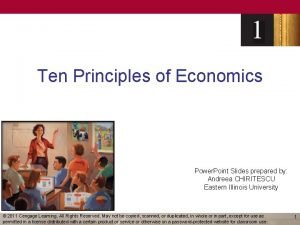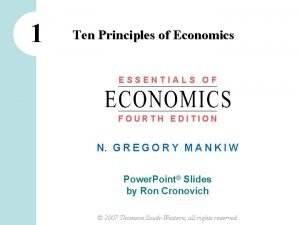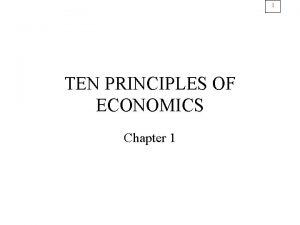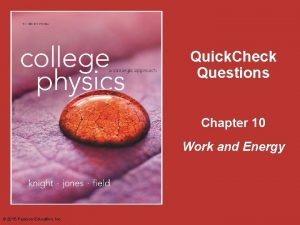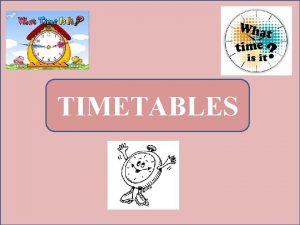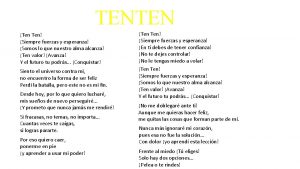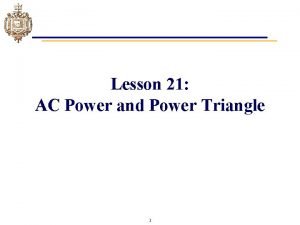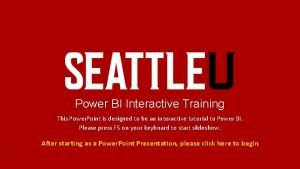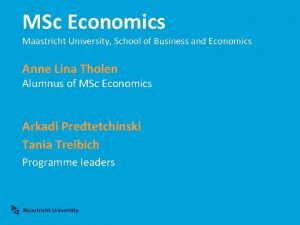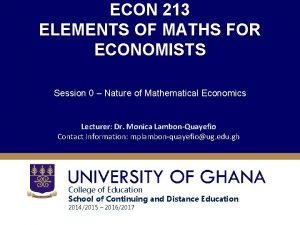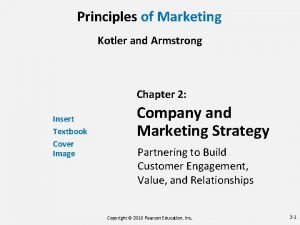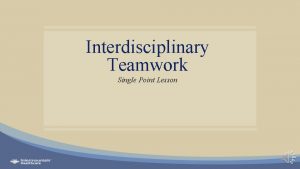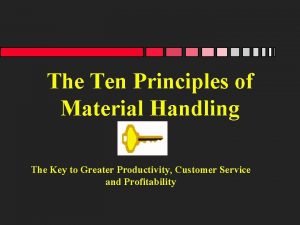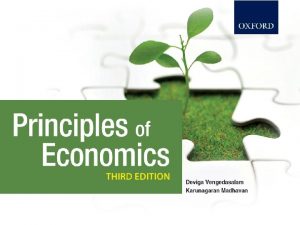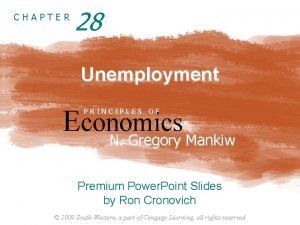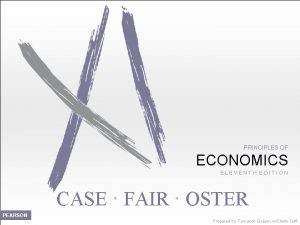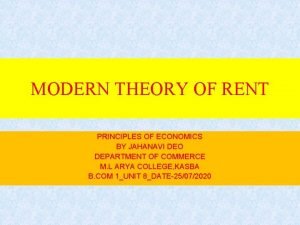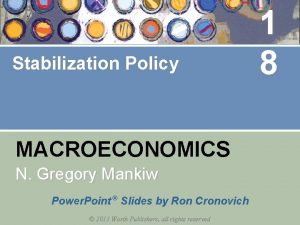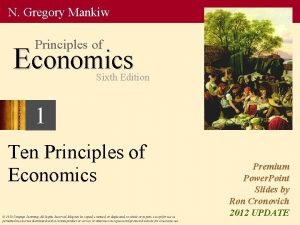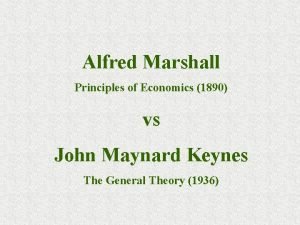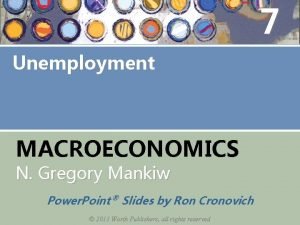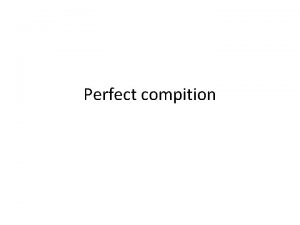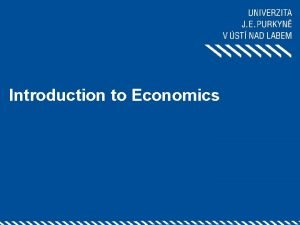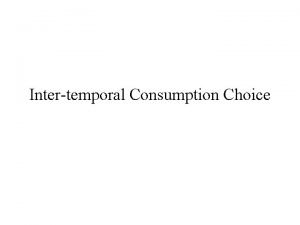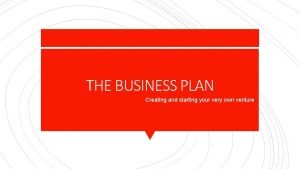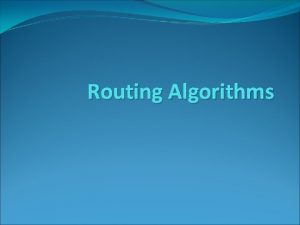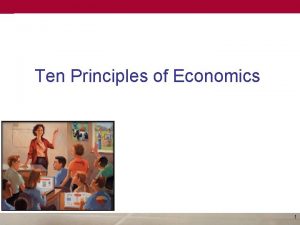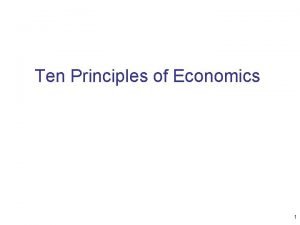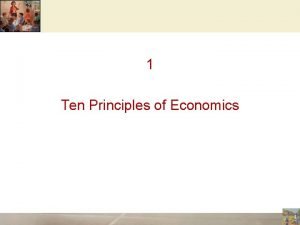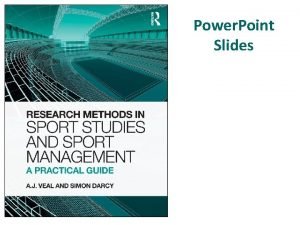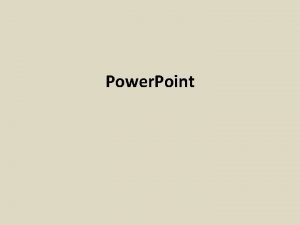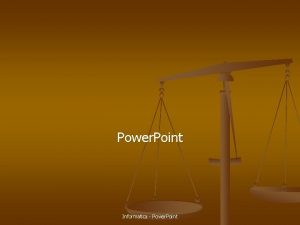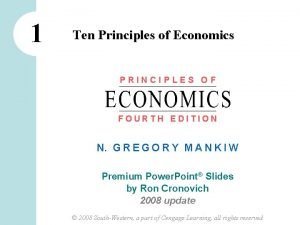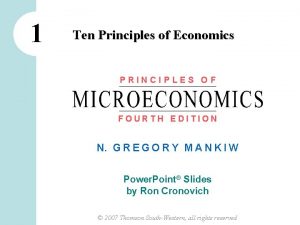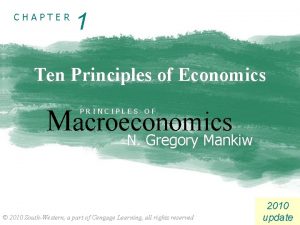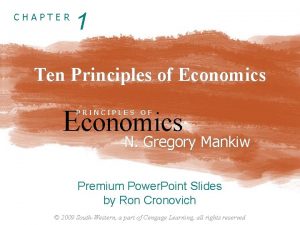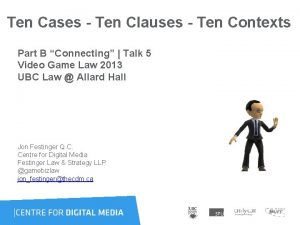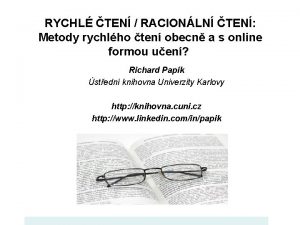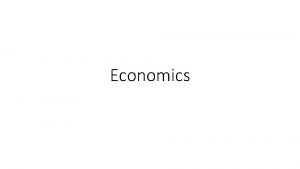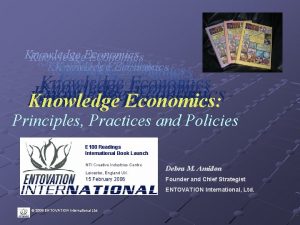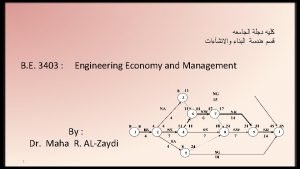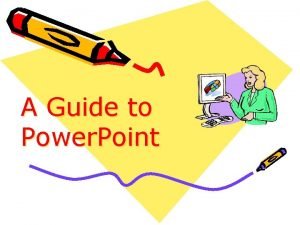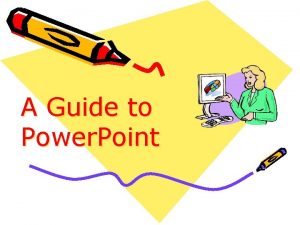Ten Principles of Economics Power Point Slides prepared






























- Slides: 30

Ten Principles of Economics Power. Point Slides prepared by: Andreea CHIRITESCU Eastern Illinois University © 2011 Cengage Learning. All Rights Reserved. May not be copied, scanned, or duplicated, in whole or in part, except for use as permitted in a license distributed with a certain product or service or otherwise on a password-protected website for classroom use. 1

Overview • Self-introduction • Syllabus • Ten principles of Economics Three groups How People Make Decision (The first four) How People Interact (discussed later) How the Economy as a Whole Works (discussed in later chapters)

Self-Introduction • Xiaoyi Han (韩晓祎) • Now an assistant professor at WISE, Xiamen University (XMU) • Email: han. 293@osu. edu • Office: D 328, Economics Building • Office hour: Friday, 3: 00 pm -4: 30 pm • Research field: spatial econometrics, Bayesian econometrics

Self-Introduction (cont'd) • Hometown: Hainan Island, very south of China • Education: 2004 -2008, Zhejiang University, Hangzhou, China 2008 - 2014, Ph. D. in Economics, The Ohio State University (OSU), Columbus, OH, USA.



Two TAs • Xiaoyan Lan (蓝晓燕) • Tuesday, 2: 30 -4: 30 pm • 501358608@qq. com • Xing Zhou (周星) • Thursday, 4: 00 -6: 00 pm • 914398026@qq. com

Some comments on Syllabus • Textbook: Principle of Macroeconomics, N. Gregory Mankiw, 6 th edition, South. Western Cengage • If you buy used version of the textbook (the 5 th, or even the 4 th), it's fine. But pay attention to compare the chapters. • The course website is http: //hanxiaoyi. weebly. com/teaching. html All slides, practice questions, answers will be uploaded on the website.

Quizzes and exams • 6 Quizzes. Dates of Quizzes are listed in the syllabus • Your lowest quiz will be dropped. • 1 midterm • 1 final • Final is cumulative

Attendance Do I need to attend every lecture? (The class time is really bad. . . ) • The answer is: attendance accounts for 5% of your total grade • I will randomly check your attendance 4 times starting from the 3 rd lecture. • Each attendance earns 1. 25 points. • Three (3) or more unexcused absences will result in automatic failure for the course. This is the requirement of WISE • It is up to you to decide whether you should attend every lecture or not, my suggestion is • You need to attend the lecture with quizzes or exams, Otherwise you will lose your credit!!

Bonus from participation • Class participation is greatly encouraged • If you contribute to class discussion, you will receive 0. 5 point each lecture • Try to answer or ask questions, share your opinions, especially in English • Note that the maximum bonus points you can earn from class participation is 4.

What is Economics? • All economics questions rise when we want more than we can get – Our inability to satisfy all our wants is called scarcity. – Because we face scarcity(稀缺性), we must make choices. – Economics studies the choices that individuals, businesses, governments, and entire societies make and their interactions.

Ten Principles of Economics • Resources are scarce (Main Assumption) • Scarcity – The limited nature of individual or society’s resources • Economics – Study of how society manages its scarce resources (Macro) – Study of how individual make decisions given limited resources (Micro) © 2011 Cengage Learning. All Rights Reserved. May not be copied, scanned, or duplicated, in whole or in part, except for use as permitted in a license distributed with a certain product or service or otherwise on a password-protected website for classroom use. 13

How People Make Decisions Principle 1: People face trade-offs • Making decisions (choices) – Trade off one goal against another – Student – time – Parents – income – Society (government, firms) • National defense vs. consumer goods • Clean environment vs. high level of income • Fiscal cliff: Decrease budget deficit vs. economic growth © 2011 Cengage Learning. All Rights Reserved. May not be copied, scanned, or duplicated, in whole or in part, except for use as permitted in a license distributed with a certain product or service or otherwise on a password-protected website for classroom use. 14

How People Make Decisions Principle 2: The cost of something is what you give up to get it • People face trade-offs – Make decisions • Compare cost with benefits of alternatives • Opportunity cost (OC) – Whatever must be given up to obtain one item © 2011 Cengage Learning. All Rights Reserved. May not be copied, scanned, or duplicated, in whole or in part, except for use as permitted in a license distributed with a certain product or service or otherwise on a password-protected website for classroom use. 15

Classical Example • The decision to go to college, think about the OC • You need to pay tuitions, books rooms. . • But what is the greatest cost? what do you give up to go to college? • Your time! if you don't go to college, you can work and might earn lots of money!

More on OC • OC emphasizes on the cost size. • Of course to choose something, you have to compare the cost with its benefit. • If the cost of doing A, mainly the OC, already outweigh the benefits of doing A • You should not choose A.

Lebron James' Decision

Enter NBA • Why did Lebron choose to enter NBA instead of going to college? • LBJ: compare the cost and benefit of going to College (OSU)? • Benefit: NCAA championship, or a bachelor's degree in economics? • What's the OC of going to college? • He would have given up all the potential years of NBA paycheck and all glories • The OC is too much campared with the benefits. • So he chose to enter NBA

To Miami (2010 Summer) • Why did Lebron James choose to bring his talent to the south beach instead of staying in Cleveland? • Compare the benefit and the cost of staying here • Staying: more glories, or a higher salary? • The OC of staying: he gave up a higher likelihood of championship • The OC of staying exceed the benefit

More on OC • Usually we will have several alternatives available when making decisions • Some textbook define OC as: the highest valued alternatives that must be given up • You choose A, have to give up two alternatives B and C; The value of B is larger than that of C; • The OC of doing A is B; • But we simpify the question: two options available.

Lebron James finally got his title! • Actually, we simplify the question because at that time he had many options: Cleveland, Miami, Chicago, NY. . . . • He believed the best alternative other than Cleveland is Miami.

It is not the end. . • 2014 Summer, he chooses to go home, go back to Cleveland! • Why did he choose Cleveland over Miami? • What is the OC of staying at Miami? • a larger likelihood of championship • a longer healthy career • a better reputation

How People Make Decisions Principle 3: Rational people think at the margin • Rational people (Strong Assumption) – Systematically & purposefully do the best they can to achieve their objectives • Marginal changes – Small incremental adjustments to a plan of action © 2011 Cengage Learning. All Rights Reserved. May not be copied, scanned, or duplicated, in whole or in part, except for use as permitted in a license distributed with a certain product or service or otherwise on a password-protected website for classroom use. 24

How People Make Decisions • Marginal benefits – Additional benefits • Marginal costs – Additional costs • Rational decision maker – Take action only if: – Marginal benefits > Marginal costs © 2011 Cengage Learning. All Rights Reserved. May not be copied, scanned, or duplicated, in whole or in part, except for use as permitted in a license distributed with a certain product or service or otherwise on a password-protected website for classroom use. 25

Example • An airline wants to decide how much to charge passengers who fly standby • The average cost of flying a passenger is $500 • The plane is about to take off with 10 empty seats: • Should the airline sell the ticket at $300? • Yes! The additional cost of adding one more is tiny! • The additional benefit of adding one more is $300

More on MB and MC • Marginal cost is different from OC since they emphasize on different aspects. • However, in some settings, they might be related • A firm decides whether to hire a worker • MB: additional profit that the worker can bring, for example, $500; • MC: wage paid to the worker, say $300 • MB>MC; • OC of hiring the worker? • the firm could use $300 to buy other things(machine). $300 is the OC

How People Make Decisions Principle 4: People respond to incentives (a very general principle) • Incentive – Something (a reward or a punishment) that induces a person to act – Attendance – Higher price (iphone 6) • Buyers - consume less • Sellers - produce more – Public policy • Change costs or benefits • Change people’s behavior © 2011 Cengage Learning. All Rights Reserved. May not be copied, scanned, or duplicated, in whole or in part, except for use as permitted in a license distributed with a certain product or service or otherwise on a password-protected website for classroom use. 28

Examples • LBJ wants to bring his talent to the south beach because championship is an incentive for him • seat belt laws: seat belts give driver incentives to drive faster because they lower the likelihood of death in accidents. More accidents, increase in pedestrian death

Table 1 Ten Principles of Economics © 2011 Cengage Learning. All Rights Reserved. May not be copied, scanned, or duplicated, in whole or in part, except for use as permitted in a license distributed with a certain product or service or otherwise on a password-protected website for classroom use. 30
 Principles of economics powerpoint lecture slides
Principles of economics powerpoint lecture slides One of the ten principles of economics in chapter 1
One of the ten principles of economics in chapter 1 One of the ten principles of economics in chapter 1
One of the ten principles of economics in chapter 1 Ten principles of economics chapter 1
Ten principles of economics chapter 1 A small child slides down the four frictionless slides
A small child slides down the four frictionless slides John pushes hector on a plastic toboggan
John pushes hector on a plastic toboggan It’s twenty to two
It’s twenty to two Ten ten siempre fuerzas y esperanza
Ten ten siempre fuerzas y esperanza Ten ten program
Ten ten program Power triangle
Power triangle Power bi training powerpoint
Power bi training powerpoint Point point power
Point point power Economics and business economics maastricht
Economics and business economics maastricht Econ213
Econ213 Marketing plan kotler
Marketing plan kotler What is interdisciplinary teamwork
What is interdisciplinary teamwork What is the unit load principle
What is the unit load principle Ten point program
Ten point program Oxford fajar
Oxford fajar Principles of economics chapter 28 answers
Principles of economics chapter 28 answers Principles of economics case fair oster
Principles of economics case fair oster Features of modern theory of rent
Features of modern theory of rent Principles of economics mankiw 9th edition ppt
Principles of economics mankiw 9th edition ppt Principles of economics sixth edition
Principles of economics sixth edition Keynes marshall
Keynes marshall Principles of economics mankiw 9th edition ppt
Principles of economics mankiw 9th edition ppt Economics shutdown point
Economics shutdown point Short run shutdown point
Short run shutdown point Fisher separation theorem graphically
Fisher separation theorem graphically The business plan should be prepared by
The business plan should be prepared by After a node has prepared an lsp it must be disseminated to
After a node has prepared an lsp it must be disseminated to
